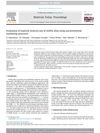Male Alopecia, Finasteride, and Cancer Risk
February 2012
in “
Community oncology
”

TLDR Finasteride for hair loss may increase the risk of certain cancers and has side effects; better regulation and education on its use are needed.
The document discusses concerns regarding the use of finasteride, a drug approved for the treatment of male pattern alopecia (MPA) and benign prostatic hyperplasia, and its associated risks of male breast cancer and high-grade prostate cancer. Finasteride inhibits the conversion of testosterone to dihydrotestosterone and has been available since 1992 for benign prostatic hyperplasia and since 1997 for MPA. Despite its benefits for hair restoration, finasteride has side effects such as infertility, depression, gynecomastia, and an increased risk of male breast cancer. The Prostate Cancer Prevention Trial (PCPT) indicated that finasteride increases the risk of high-grade prostate cancers while reducing low-grade cancers. The document highlights the ease of obtaining finasteride through online pharmacies, which poses additional risks due to potential unsupervised use and the possibility of inferior quality drugs. The authors suggest stricter regulations for online pharmacies and education for physicians and patients about the risks of unsupervised finasteride use. They emphasize the need for future studies to evaluate whether the benefits of low-dose finasteride for hair restoration outweigh the cancer risks.






